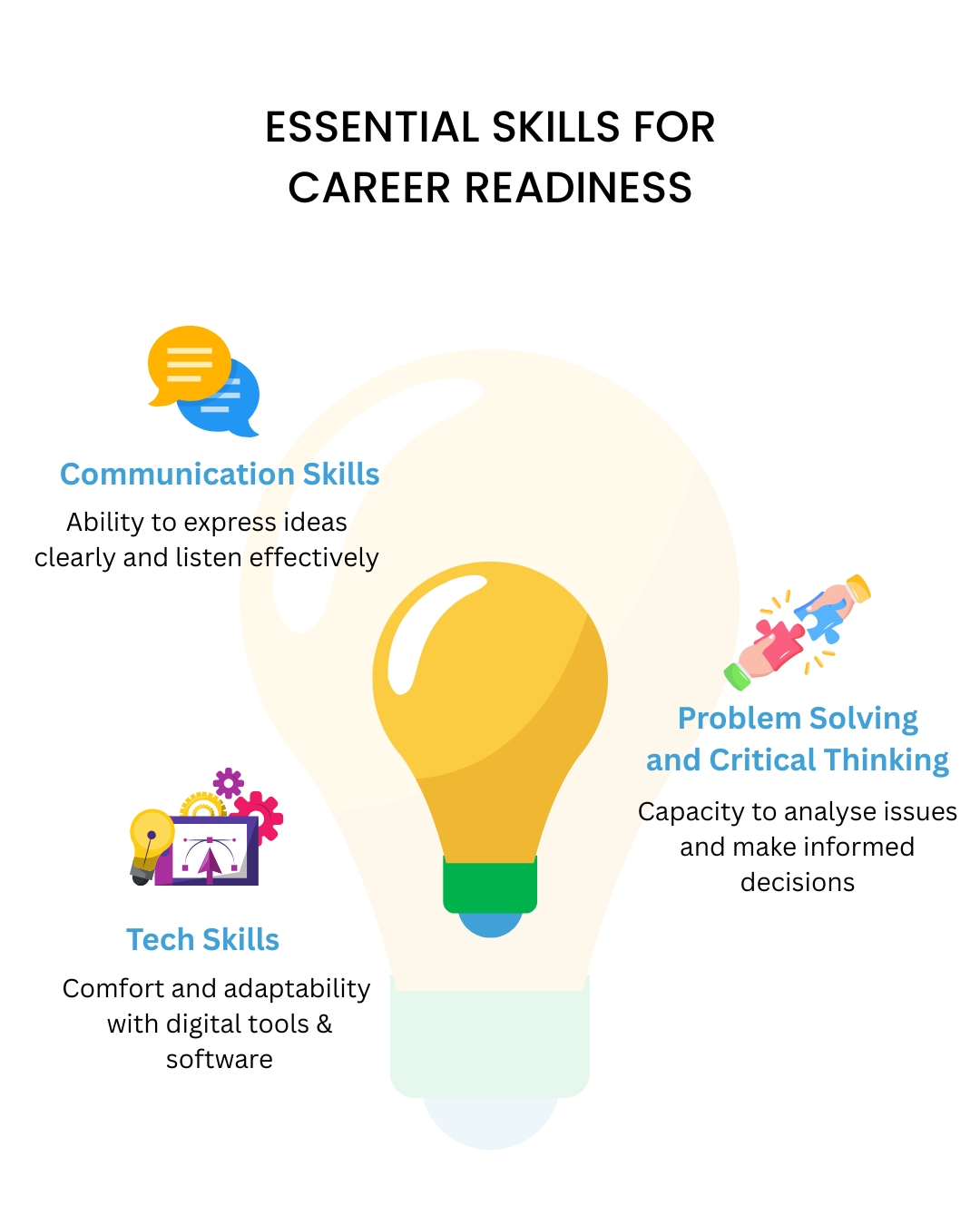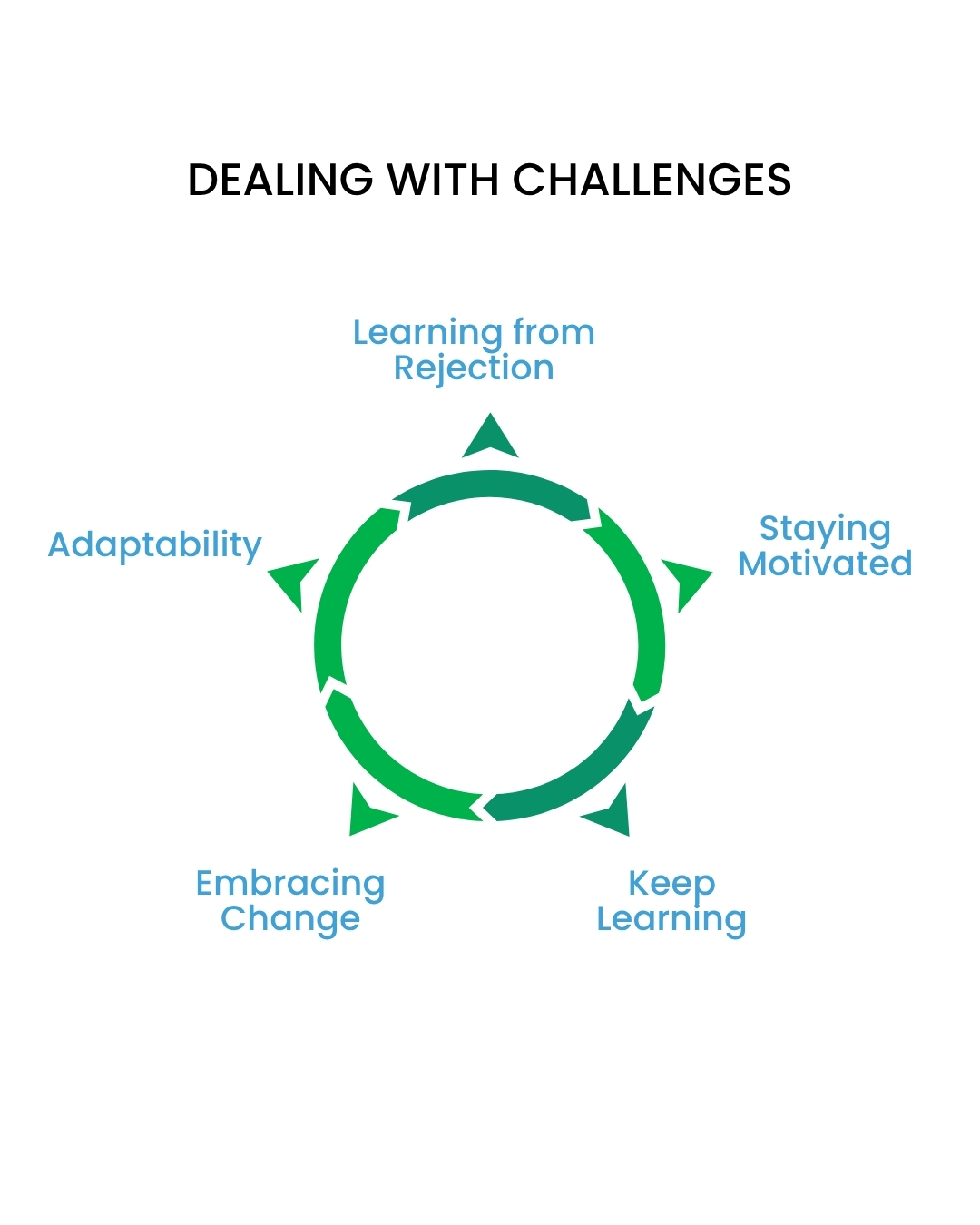
July 20th, 2025 • 3 min read
What is Career Readiness?
If you’re a teenager planning for your future or a parent looking to guide your child toward the working world, you might be curious about what it takes to be prepared for a career. We call that as being career ready. So, what does it mean to be “career ready” and thrive in today’s job market?
Career readiness is defined as “a foundation from which to demonstrate requisite core competencies that broadly prepare the college educated for success in the workplace and lifelong career management” (NACE).These aren't just the specific skills you need for one particular job (like knowing how to code if you want to be a programmer), but the everyday skills that help you work well with others, solve problems and keep learning new things.
Think of career readiness as a bridge between school and the real world. In school, you learn facts and take tests. At work, you need to use what you've learned to solve real problems, work with different types of people and adapt when things change. Career readiness helps you make that jump effectively.
This is especially important for teenagers because the job market is changing faster than ever before. The jobs available when you graduate might be completely different from the ones that exist today. Preparing for multiple job types prepares you to explore different options and choose what is best for you by making informed decisions. It can result in growth, leading to a better financial future no matter what career path you choose.

Here’s How You Can Be Career Ready:
1. Building the Skills You'll Need
So what skills do you actually need to be career ready? Let's understand this in detail:
- Communication Skills : This might sound obvious, but being able to communicate well is important in any career. We're talking about being able to explain your ideas clearly, listen to others, write professional emails and even give presentations with more confidence. Whether you're talking to your boss, working with a team or helping a customer, good communication skills will make you stand out.
- Problem-Solving and Critical Thinking : Every job involves solving problems (it's part of working life). Maybe you need to organise an event, or a customer has a complaint, or your team needs to figure out how to finish a project on time. Being able to think through problems step by step, consider different solutions and make good decisions is incredibly valuable.
- Technical Skills : You don't need to be a computer genius, but you do need to be comfortable with technology. This means being able to learn new software quickly, understanding how to use digital tools to get your work done and staying up-to-date with new technology.
These assessments don’t give you a final answer, but they act like a mirror, reflecting your own interests and what feels natural and energising to you.
2. Getting Real-World Experience
Reading about work and actually doing it are two very different things. That's why getting some real-world experience while you're still in school is so valuable. You can read more about it in one of our blogs titled "How to Choose A Career" for some ways to do that.
3. Taking Care of Your Well-Being
Here's something that doesn't get talked about enough: taking care of your well being is a crucial part of being career ready. The working world can be stressful and learning how to manage that stress while you're young will help you throughout your career.
- Managing Stress : Whether it's dealing with difficult people, tight deadlines or just the general pressure of work, stress is part of having a job. Learning healthy ways to cope with stress like exercise, going to therapy, eating healthy, talking to friends, or taking breaks when you need them will help you stay productive and happy at work.
- Finding Balance : Work is important, but it's not everything. Learning how to balance work with the other things that matter to you (family, friends, hobbies) is a skill that will serve you well throughout your life.
- Asking for Help : Nobody expects you to figure everything out on your own. Being able to ask for help when you need it (whether it's from a coworker, your boss or an expert) is actually a sign of strength, not weakness.

4. Dealing with Challenges and Setbacks
Let's be honest: your career journey won't always be smooth. You might not get the first job you apply for, or you might realize that a career you thought you wanted isn't actually right for you. That's completely normal! The following things will help you be career ready:
- Learning from Rejection : Getting rejected for a job or internship stings, but it's also a learning opportunity. Ask for feedback, figure out what you can improve and keep trying. Every "no" gets you closer to a "yes."
- Staying Motivated : There will be times when you feel discouraged or unsure about your future. This is normal! Talk to people you trust, remember why you're working toward your goals and celebrate small victories along the way.
- Keep Learning : The most eminent people never stop learning. Whether it's taking a class, reading about your industry or just being curious about how things work, maintaining a learning mindset will help you stay relevant and engaged throughout your career.
- Embracing Change : The job market will continue to change throughout your career. Instead of being scared of change, try to see it as an opportunity to grow and try new things. The people who embrace change rather than resist it tend to excel.
- Adaptability : The ability to adapt with changes, learn new things quickly and stay positive when things don't go as planned will serve you well throughout your career. Jobs change, companies change and entire industries can transform. People who can adapt will always be in demand.
Your Next Steps: Preparing for a Dynamic Future
Being career ready isn't about having everything figured out right now (it's about developing the skills and mindset that will help you excel no matter what path you choose). For parents, the best thing you can do is support your teenager's exploration of different career paths while helping them develop these fundamental skills. Encourage them to try new things, ask questions and learn from their experiences.
Remember, career readiness is a journey, not a destination. You don't need to have complete certainty. What matters is that you're taking steps to prepare yourself for whatever opportunities come your way.
Ready to discover the extent of your career readiness in the domains of confidence , concern, curiosity and consultation?
Take our career readiness assessment and begin your journey toward professional excellence.